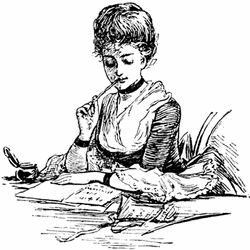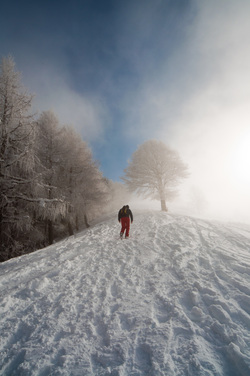CREATIVE WRITING
Story openings (THE FOLLOWING WRITING TIPS ARE PROVIDED COURTESY OF MIDLANDIT.CO.UK)
Always try to make the opening of a story interesting or exciting for the reader(Don't start with One day - that's boring!)
There are three different ways to start a story:
Dialogue: "Sharks!" shouted the ship's look out, "hundreds of them!"
"They seem to be heading our way," cried the Bo'sun.
Action: An ear splitting whistle made all the pirates leap to attention. At once they ran in different directions, bumping into one another, scrambling over untidy piles of ropes and tarpaulin, sliding down rickety ladders, all trying to be the first in the queue for lunch.
Description: The sea glistened like a sparkling, silver mirror. Waves lapped gently at the sides of the Saucy Sue as she sailed silently along in the cool, refreshing breeze, her Jolly Roger flag fluttering limply. Seagulls circled overhead, calling to each other. No-one would guess what terrible adventure lay ahead for Captain Peg-Leg and his crew of daring pirates.
Take a look at the openings of some of your favourite stories to see how the authors started their stories.
Try different ways of starting a story, then use the one you like the best.
Characters
Two or three characters are usually enough for a short story. Here's how to make the characters sound real:
Give them suitable names.
For example:
Pirates: Captain Peg-Leg, Scar-faced Bill, Sly Sam, One-eyed Pete
Astronauts: Commander Ben Lewis, Assistant Commander Buzz Owens, Captain Tilly Jones
Don't just use your friend's names in a story!
Describe what they look like and how they move.
For example:
A wizened old man shuffling about the house in slippers. A giant, hairy, orange caterpillar creeping slowly along. A ten year old girl, rather small for her age, skipped merrily along the street, her long fair hair flying in the wind.
Try to show their personalities in the things they do, for example:
Careless - always breaking or losing things
Lazy - never wants to do anything, finds quicker ways of doing things
Coward - nervous, hides behind the others, stammers and stutters
Competitive - tries to do things better and faster, wants to win
Posh - Talks very properly, snooty, thinks better than everyone else
Try to show how they feel using adjectives and adverbs, for example:
tired, excitedly, grateful, angrily, happy, sadly, curious, worriedly, relieved, nervously
Write what they say and what they think.
For example:
" I'm sure I'll be able to fix the spacecraft." At that moment she believed herself.
Improving setting descriptions
Use similes and metaphors for richer descriptions Imagine you are taking a video of everything you can see happening in the scene. Write detailed descriptive sentences Expand sentences to explain who, what, how,where, when, and why something happened, like this:
The tiny bird hopped quickly across the garden, picked up the bread, and immediately flew off to a safe place to eat it.
Write colourful sentences by grouping adjectives together to create:
Alliteration(words starting with the same letter) - e.g. dark, dank, dreary forest; crowded, cobbled streets Rhyme - e.g. hustle and bustle; a rumbling and a tumblingPatterning - e.g. in the highest branches of the furthest tree; travelling faster and faster
Onomatopoeia (words that sound like the thing they describe)- e.g. jingling, jangling, tinkling coins.
Similes compare one thing to another and are introduced by the words 'like' or 'as', e.g. The wet mud was sticky like fudge cake.
Metaphorscompare one thing with another, but are not introduced by 'like' or 'as', e.g. The wet mud was sticky fudge cake.
Similes for the following topics could be:- The moon hung in the sky like it was on an invisible thread.
- The storm was as violent as a ranting bull.
- The wind was like a roaring lion shaking its mane.
To change the similes to metaphors, take out the words as and like:- The moon hung in the sky on an invisible thread.
- The storm was a ranting bull.
- The wind was a roaring lion shaking its mane.
Events
An interesting story will contain several events.
A strong exciting plot centres on an unexpected event, a crisis, or a problem, which needs to be sorted out by the end of a story. Stories can contain more than one problem. Plans could go wrong:- There could be an accident.
- Someone or something could get lost.
- A machine could break down.
- Something important could get stolen.
Descriptive sentences of different lengths can create suspense:
Suspense or mystery is created by
building up to events slowly.
Don't just write: The monster attacked.
Hint at the attack by, for example, using speech:
A very hairy monster slid amongst the trees, hid behind a bush and watched hungrily. The monster growled.
"What was that?" asked Christopher in a very scared voice.
"Probably just the wind," replied Luke.
"No, it sounded like a lion's roar," said Christopher anxiously.
"Listen and see if you can hear it". The monster growled again and this time Luke heard it.
"That noise?" he asked.
"Yes!" replied Christopher. Next moment the monster leaped from behind a bush and started to attack
Story endings
Explain the result of the events or show how the problem was solved. (But don't end with everyone going home for tea or someone waking up to find it was all a dream - that's boring!)
Endings usually bring the story round 'full circle'. For example,
Start: Three scruffy pirates sat gloomily around a table in the Lord Nelson pub, staring down in to their empty beer glasses. One by one they emptied out their pockets. It seemed they had all run out of money.
Ending: The pirate gang made their way down the quay to their favourite pub to celebrate their success. They had earned enough money now to buy a year's worth of beer - and have change. The final sentence is as important as the opening sentence. It usually sums up the story's theme or message.- It had been the best day of my life.
- I'll never forget her.
- If only he hadn't been so selfish.
- She realised taking part is much more important than winning.
- It just goes to show, crime really doesn't pay.
- They were richer than they could ever have dreamed.
- I still laugh when I think about it.
For more ideas, look at some of your favourite stories and check out the very last sentence in each.


Snow
The day after the snow fell, I decided to visit my neighbour. I brought my camera and took photos as I trudged through the still whiteness. It was late afternoon and snow clung to the trees overhanging the boreen. A woman passed with three dogs as I took a photograph of snow heaped on the delicate tendril of a bramble. It was really, really quiet and very cold. I walked on a few steps and gasped as my right foot collapsed through the snow. A loud crack echoed through the silence just as I hit the ground. Then I screamed....
Write your own short story. It must be exactly 100 words long. Best entries will be published on the website..
*******************************************************
SNOW SIMILES
Similes compare two things by using the words
like or as.
Think of things about the snow or animals that live in it.
Write some similes about them.
Here is a simile about snow:
The snow looked like silver beads on my coat.
Can you write one?
The day after the snow fell, I decided to visit my neighbour. I brought my camera and took photos as I trudged through the still whiteness. It was late afternoon and snow clung to the trees overhanging the boreen. A woman passed with three dogs as I took a photograph of snow heaped on the delicate tendril of a bramble. It was really, really quiet and very cold. I walked on a few steps and gasped as my right foot collapsed through the snow. A loud crack echoed through the silence just as I hit the ground. Then I screamed....
Write your own short story. It must be exactly 100 words long. Best entries will be published on the website..
*******************************************************
SNOW SIMILES
Similes compare two things by using the words
like or as.
Think of things about the snow or animals that live in it.
Write some similes about them.
Here is a simile about snow:
The snow looked like silver beads on my coat.
Can you write one?
